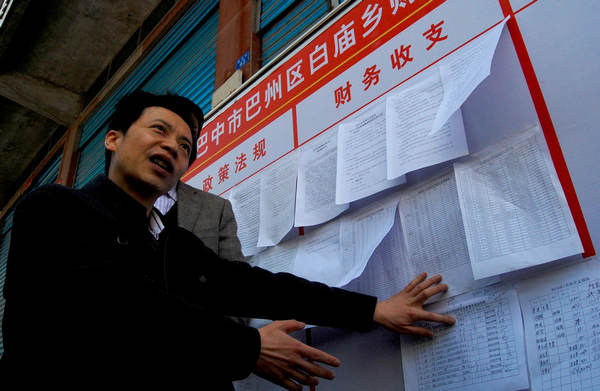
While central government departments are busy releasing information about how many cars they maintain and how many overseas trips their officials made last year, a small town in Southwest China is setting an example by releasing details of every penny it spent.
The government of Baimiao township, in the Bazhou district of Bazhong, a city in Sichuan province, has posted detailed information on its monthly expenditures on both its bulletin board and its website, www.bzbmx.gov.cn, since January 2010.
 |
|
Zhang Yingshang, Party secretary of Baimiao township in Sichuan province, talks to villagers about local spending. Xu Hui / China News Service |
Li Anguo, a farmer in Baimiao township, has found that a dwindling number of villagers gather in front of the bulletin board.
"There used to be hordes of villagers looking at the detailed information pertaining to what the township government spent on car fares, official banquets and travel expenses each month," the 67-year-old farmer said on Thursday. "The number of onlookers is on the decline now because posting the information on the bulletin board has become a monthly routine."
On the list of its expenditure last month, villagers could see that the township government spent 680 yuan ($110) on three meals to entertain officials from governments at higher levels, and on businessmen who were looking for business opportunities in Baimiao; and another 9,456 yuan on investment promotion in Chengdu, capital of Sichuan, and in Shandong province. The names of people who approved and certified the meals and travel are on the list.
With the backing of leading officials in the Bazhong city government, Baimiao had its monthly expenditure publicized on the Internet two and a half years ago to ease public concern that the township government might spend government funds extravagantly.
"Thanks to public supervision, officials here have become more self-disciplined, and the township government can save between 30,000 and 40,000 yuan a year," said Zhang Yingshang, the township's Party secretary.
Zhang said the money saved has gone to poor families before?Spring Festival, to buy chickens and pigs for the poor to raise, and to improve the environment.
The township's 30 public servants got 210,000 yuan last year while the budget for this year is 260,000 yuan, he said.
The regular announcement on government spending has made the township well known by local businessmen who now consider the government to be clean.
"A total of 23 companies from Chengdu, Shanghai, Beijing and Guangdong and Shandong provinces have shown interests in investing here thanks to preferential investment promotion policies made by the Bazhong city government," Zhang said.
One such firm was a Chengdu-based company specializing in the extraction of medicinal components from honeysuckle. The firm set up a base in Baimiao late last year.
"Some 1,000 households are planting honeysuckle in Baimiao. And on average, each planter has earned more than 1,500 yuan by selling fresh honeysuckle to the base this year," said Tang Jitai, a farmer in Zhaoshan village of Baimiao.
His family of three have earned 33,000 yuan for selling honeysuckle this year. His son, a migrant worker, has come back to join him.
"With 10 villages and one neighborhood committee, Baimiao is home to 11,000 people whose annual average income was 3,393 yuan, according to the latest statistics conducted in 2009," Zhang said.
He said a daily average of 1,000 people click the Baimiao township government website. Many of them are locals working outside who want updates about news on their hometown.
A middle-aged native of Baimiao who had raised chickens in Beijing for six years went back to his hometown late last year to open a chicken farm after he heard that Baimiao has taken the lead in the country to make its expenditure transparent.
Trusting the township government, the man who only wanted to be identified as Xiang said: "I will increase the number of chickens in the farm from 50,000 to 500,000 in the next four to five years."







